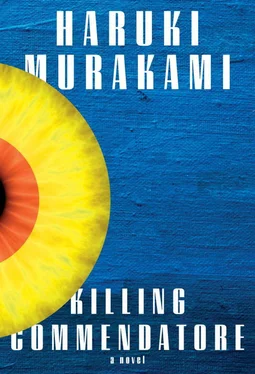The ceiling was high, the lighting subdued. Refined indirect lighting on the walls, a few floor lamps, and reading lamps on the tables. At the back of the room was a black grand piano. I’d never seen a Steinway concert grand piano in a room like this, one that made it seem smaller than it was. On top of the piano was a metronome and sheet music. Perhaps Menshiki played. Or maybe he invited Maurizio Pollini over for dinner every once in a while.
Overall, though, the room was modestly decorated, and I felt relieved. There was nothing excessive, but it didn’t have an empty feeling. A comfortable room, despite the size. There was a certain sense of warmth about it, you might say. Half a dozen tasteful paintings graced the walls, all modestly displayed. One of them looked like a real Léger, but I could have been mistaken.
Menshiki motioned me to a large brown leather sofa. He sat on a matching easy chair across from me. The sofa was extremely comfortable, neither too hard nor too soft. The kind of sofa that naturally adjusted to whoever sat on it. Of course if you think about it (not that it was something one had to think about), Menshiki wasn’t about to put an uncomfortable sofa in his living room.
As if he’d been waiting for us to get settled, as soon as we did, a man glided in from somewhere. A stunningly handsome young man. He wasn’t so tall, but was slim and had a refined bearing about him. His skin was evenly tanned, with lustrous hair done up in a ponytail. He would look good at the beach, in surfing shorts, carrying a shortboard, though today he was dressed in a clean white shirt and black bow tie. A pleasant smile played about his lips.
“Would you care for a cocktail?” he asked me. ““Please order whatever you’d like.”
“I’ll have a Balalaika,” I said, after considering it for a few seconds. Not that I really wanted a Balalaika, but I wanted to test the young bartender to see if he really could make any kind of drink.
“I’ll have the same,” Menshiki said.
The young man smiled pleasantly and soundlessly withdrew.
I glanced at the spot next to me on the sofa but didn’t see the Commendatore. But he had to be here somewhere in the house. He’d ridden with me in the car up to the house, and had come along with me.
“Is something the matter?” Menshiki asked me. He’d followed my glance.
“No, just admiring your gorgeous house.”
“It’s a little too much, don’t you think?” Menshiki said, a smile rising to his face.
“No, it’s much more serene than I imagined,” I answered honestly. “From a distance it does look a bit luxurious. Like a luxury cruise ship on the ocean. But inside it’s surprisingly relaxed. My impression’s completely changed.”
Menshiki listened and nodded. “I’m happy to hear that, but it took quite a lot of work to get it to that point. I bought the house already built, and when I purchased it, it was pretty gaudy. Flashy, you might say. A man who ran a big-box store built it. The extremes of bad taste of the nouveau riche, you could say, and not my style at all. So I did a huge renovation after I bought it. Which took a lot of time, effort, and money.”
As if remembering all that work, Menshiki looked down and sighed. It really must not have suited his taste at all.
“Wouldn’t it have been a lot cheaper to build your own house?” I asked.
Menshiki smiled, his white teeth peeking from between his lips. “You’re absolutely right. That would have been the sensible thing to do. But I had my own reasons. Reasons why it had to be this house and no other.”
I waited for the story to go on, but it didn’t.
“Wasn’t the Commendatore supposed to be with you tonight?” Menshiki asked.
“I think he’ll be along later,” I said. “We were together on the trip up to your house and then he suddenly vanished. I think he must be taking a tour of your house. You don’t mind, do you?”
Menshiki spread his hands wide. “Of course. Of course I don’t mind. He’s welcome to look around as much as he likes.”
The young man from before appeared, carrying two cocktails on a silver tray. The cocktail glasses were exquisitely cut crystal. Baccarat, would be my guess. They glittered in the light from the floor lamp. Next to them was a Koimari ceramic plate with slices of various cheeses and cashews. There were small monogrammed linen napkins and a set of silver knives and forks. Everything well thought out.
Menshiki and I picked up our cocktail glasses and made a toast. He toasted the completion of his portrait, and I thanked him. We lightly put our lips to the rim of the glasses. A Balalaika is made of one part each of vodka, Cointreau, and lemon juice. A simple concoction, but unless it’s as bitingly freezing as the North Pole, it doesn’t taste good. If somebody who doesn’t have the right touch mixes it, it ends up tasting diluted, watery. This Balalaika was amazingly delicious, with an almost perfect bite to it.
“This is delicious,” I said, impressed.
“He’s quite good,” Menshiki said lightly.
Of course he is, I thought. Menshiki wasn’t about to hire a bad bartender. And of course he had Cointreau on hand, antique crystal glasses, and a Koimari serving plate.
As we sipped our cocktails and munched on some nuts, we talked about various topics. Mainly about my painting. He asked what I was working on now and I explained. I told him I was working on a portrait of a man whose name and background I knew nothing about, someone I had encountered in a distant town.
“A portrait?” Menshiki asked, sounding surprised.
“A portrait, but not a typical commercial portrait. More of an abstract-style portrait, one in which I let my imagination run free. But the motif is definitely a portrait. You might say it’s the foundation of the painting.”
“Like when you painted my portrait?”
“Exactly. Though this time I wasn’t commissioned. It’s something I decided to paint on my own.”
Menshiki considered this. “Maybe my portrait inspired you to be more creative?”
“No doubt. Though I’m only at the point where my creativity is finally starting to kick in.”
Menshiki took another soundless sip of his cocktail, with what I took to be a satisfied gleam deep in his eyes.
“Nothing could make me happier,” he said. “The fact that I may have been of help to you, that is. If you don’t mind, could I see that new painting when it’s finished?”
“I’d be happy to show it to you, provided I’m happy with the result.”
I looked over at the grand piano in a corner of the room. “Do you play piano, Mr. Menshiki? That’s a beautiful instrument.”
Menshiki nodded slightly. “I’m not good, but I do play a little. I took piano lessons as a child. Five or six years from the time I entered elementary school until I graduated. Then I got busy with schoolwork and quit taking lessons. I wish I hadn’t, but the piano lessons had worn me out. So my fingers don’t move the way I’d like them to, but I’m good at reading sheet music. I play some simple pieces every once in a while just for my own amusement, for a change of pace. I’m not good enough to play for other people, and I never touch the keys when other people are here.”
I went ahead and asked a question I’d been wanting to ask for a long time. “Doesn’t it feel a little too spacious for you, living in such a big house all by yourself?”
“No, I don’t think so,” Menshiki replied immediately. “Not at all. I’ve always preferred being by myself. Consider the cerebral cortex for a moment. Humans are provided with a wonderfully precise and efficient cerebral cortex. But normally we use, at most, less than ten percent of it. We’ve been divinely provided with this amazing, highly efficient organ, but sadly we haven’t the ability to use it completely. You could compare it to a four-person family living in a magnificent, grand mansion but using only one small room. All the other rooms are unused and neglected. When you think that way, it’s not so unnatural that I live in this house by myself.”
Читать дальше











